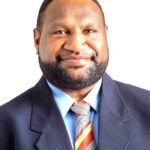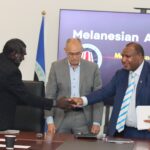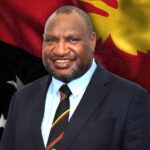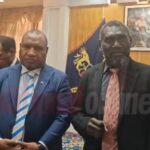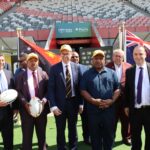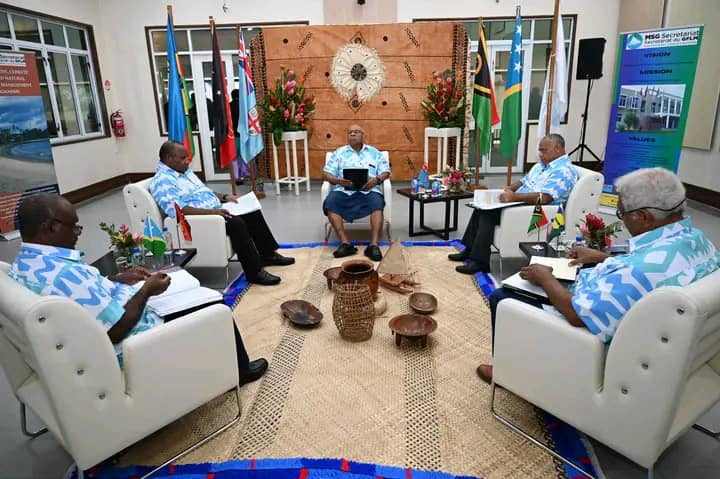Prime Minister Hon. James Marape will hold high-level political Talanoa consultations with the Eminent Persons Group (EPG) of the Pacific Islands Forum (PIF) on Sunday, 22nd June 2025, at the margins of the 23rd Melanesian Spearhead Group (MSG) Leaders’ Meeting in Suva, Republic of Fiji.
The 23rd Melanesian Spearhead Group (MSG) Leaders’ Meeting is being held from 18–24 June 2025 in Suva, Fiji. Leaders, senior officials, and representatives from member countries— Fiji, Solomon Islands, Vanuatu, Front de Libération Nationale Kanak et Socialiste (FLNKS) of New Caledonia, and Papua New Guinea — are in attendance. Also present are observers such as the United Liberation Movement for West Papua and associate member Indonesia. During the meeting, the current Chair, Vanuatu, will formally hand over the MSG Chairmanship to Fiji.
The consultations form part of broader regional efforts led by the PIF to strengthen Pacific solidarity and strategic cooperation, in response to shared challenges confronting the region and its member states.
The Talanoa process will focus on priority issues such as regional security, climate change, fisheries resource management, political governance, national sovereignty, and the institutional reforms of both regional and sub-regional groupings in the Pacific. These discussions aim to explore how best to reshape Pacific governance structures and institutional mechanisms to reflect current realities and future aspirations.
For Papua New Guinea, this engagement is a crucial opportunity to ensure that national priorities align with regional development objectives—particularly in areas such as sustainable resource use, border security, and climate adaptation. Prime Minister Marape, who consistently calls for a reformed and united Pacific architecture, is expected to advocate for stronger collaboration between MSG members and the wider Pacific community.
The EPG consultations will assess how existing regional organisations can be rationalised or restructured to improve efficiency and effectiveness. These reforms are intended to meet both regional and national needs and to align more closely with rapid technological advancements and geopolitical changes affecting the Pacific.
With growing international attention on the Pacific, the region must respond proactively through enhanced cooperation and reform-driven leadership. The Pacific Islands Forum, MSG, and other sub-regional entities are now under review as part of ongoing efforts to strengthen governance, representation, and inclusivity.
Prime Minister Marape is expected to lead discussions on the importance of regional ownership, institutional capacity-building, and the need for responsive and adaptable governance structures.
He also highlights the value of ensuring that regional decision-making remains grounded in Pacific cultural values, while embracing innovation, inclusion, and resilience.
“The Pacific region stands at a crossroads. We must take a proactive approach to safeguarding our sovereignty, protecting our resources, and ensuring that our voices are heard on the global stage. Our collective efforts must also voice strongly against human rights abuses in our region and for respect for all our people and members of our Pacific Islands Forum, the Melanesian Spearhead Group (MSG) community, and others,” says Prime Minister Marape.
“Papua New Guinea remains fully committed to regional dialogue and collective action to address the challenges that affect not just us individually, but all of us as Pacific peoples.”
The High-Level Political Talanoa (HLPT) process provides a pivotal opportunity to advance cohesive regional governance reforms.
Prime Minister Marape says consideration must be given to the political, financial, and operational implications of each rationalisation option, and a strategic pathway must be identified that balances national sovereignty with collective regionalism.
“A well-structured and efficient regional system is critical to achieving the Pacific’s long- term vision under the 2050 Strategy for the Blue Pacific Continent.
“By streamlining governance structures, strengthening political unity, and ensuring inclusive membership frameworks, the Pacific Islands Forum can move regionalism from aspirational dialogue to concrete, collective action.
“The challenges of fragmentation, inefficiencies, and divergent national interests require bold and decisive leadership. The decisions taken now will shape the trajectory of Pacific regionalism for decades to come.
“This is a defining moment for the region—one that demands commitment, collaboration, and an unwavering focus on a shared Pacific future that is resilient, sustainable, and united in its vision,” says Prime Minister Marape.


